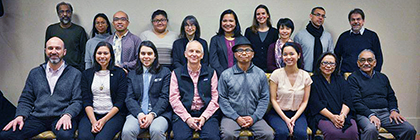How do activism and academia shape one another? Researchers from York U and other universities reflected on this question in a special section of the July 2017 issue of Critical Asian Studies. Their experiences navigating their roles as academics conducting socially engaged research in Southeast Asia offer insights into the emotional and intellectual challenges of this kind of work.
“By addressing the ethics and the viability of academic/activist collaborations, the challenges of doing work that many academic institutions do not regard as ‘scholarship’ and the blurred boundaries between academia and activism, this volume introduces important questions that all socially engaged activist-scholars should consider,” said section editor Ethel Tungohan, politics professor at York University in the Faculty of Liberal Arts & Professional Studies (LAPS).
The special section represents the critical and wide-ranging scholarship shared at a March 2017 York Centre for Asian Research (YCAR) workshop, “Research at the Interface of Activism and Academia in Southeast Asia.”

Organizer Philip Kelly, former YCAR director and York University professor, said the workshop provided a space for participants to critically reflect on how their research is produced through interactions with their respective local contexts, how their identity shaped their work, and what dilemmas they faced at the interface of activism and academia.
Kelly and Tungohan, along with York PhD candidate Chaya Ocampo Go, worked in collaboration with Elisabeth Kramer (University of Sydney), Jason Morris-Jung (SIM University) and Dominique Caouette (Université de Montréal) as editors of the special section of papers that emerged out of the workshop.
“The papers in this collection make a much-needed contribution to existing academic discussions on the relationship between academia and activism by bringing perspectives that are not centred on the Global North,” said Kelly.
The papers illustrate how the relationship between academia and activism varies across Southeast Asia, and represent research on Cambodia, Indonesia, Malaysia, the Philippines, Thailand and Vietnam.
The authors discuss what the category of “academic” or “expert” meant in their respective research contexts. Morris-Jung, for example, discusses the context of Vietnam where he found it difficult to combat popular perceptions that academic research was state sponsored. Laura Schoenberger and Alice Beban, who conduct research in Cambodia, explain that the category of “academic” had no meaning in an authoritarian context where academic research had been decimated.
All of the authors also contribute an understanding of how they navigate their individual identities and commitments to the causes they research. They draw our attention to the emotional and intellectual labour that goes into activist-academic work.
Working as both an anti-capitalist activist leader in Indonesia and a researcher based in Canada, Arianto Sangadji describes the impossibility of separating his activist and academic roles. He views the two as necessarily interconnected activities in the process of challenging the capitalist order in Indonesia.
For Ocampo Go, her research and activism with survivors of Typhoon Yolanda in the Philippines are embedded in her personal relationships. Being a researcher and activist are, for her, she said, inseparable from being a granddaughter, a niece or an aunt, because her work implicates her kin relations in profound ways.
“A growing number of scholars believe that their work should not only contribute to knowledge creation but should also be part of an ongoing effort to improve the communities within which they work,” said Tungohan.
Conducting research within networks of activist organizations and non-governmental organizations, the authors in this collection often deal with political tensions that arise in the field. At times, these tensions sit at odds with academic goals and force researchers to make difficult decisions.
Reflecting on how they tackle these decisions in the field, Peter Vandergeest, Olivia Tran and Melissa Marschke write about their encounters with activist narratives of “slavery” in addressing workers’ struggles in Thai fisheries. They found that while the category of “slavery” was a strategic simplification, it did not speak to the aspirations of the workers it implicated. The authors had to make a decision between supporting the important work being done by the activists or critiquing them.
The workshop was held alongside the Association for Asian Studies (AAS) annual conference in Toronto, and co-sponsored by the AAS Southeast Asia Council.
For links to the articles, visit ycar.apps01.yorku.ca/?page_id=7364&preview=true.


